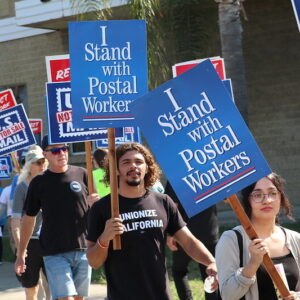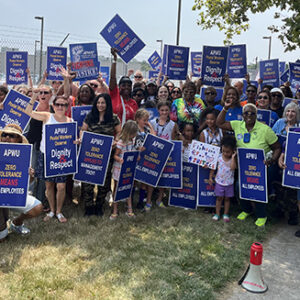January 14, 2011
OSHA: DBCS Machines Pose Risk to Workers’ Health
Management ‘Lacks Understanding’ of Risks, Agency Concludes
The Occupational Safety and Health Administration has hit the Postal Service with another unwelcome finding: Delivery Bar Code Sorter machines pose a direct risk to workers’ health, and there is a “general lack of understanding about the hazards and injuries” associated with the equipment among postal managers.
In a Jan. 4 letter to the Postmaster General, OSHA Assistant Secretary Dr. David Michaels said the agency had received more than 170 complaints alleging that “injuries occurred due to worker exposure to ergonomic stressors” associated with DBCS operation at Processing and Distribution Centers nationwide. The complaints were submitted by APWU locals in response to a request from the national union after the USPS rebuffed union attempts to correct — or even discuss — DBCS hazards.
In response to the complaints, OSHA selected nine sites for inspection as a representative sample. The inspections and ergonomic evaluation “identified generally consistent risk factors at most inspected sites,” the majority of which resulted from the repetitive motions required to operate the DBCS, Michaels wrote.
Hazards included repeated bending and twisting; forceful gripping; lifting heavy weight; shoulder exertions; extended reaches, and forceful pulling and pushing. Other risks included contact trauma, working in awkward postures, and generalized body fatigue.
“OSHA’s findings are an important step toward protecting the safety of APWU members,” said Executive Vice President Greg Bell. “Our members have known about the dangers of working on DBCS machines based on their first-hand experience. I am hopeful that OSHA’s involvement will encourage the Postal Service to correct the problems.”
Ignorance of Risks
According to OSHA’s evaluation, “almost all managers assigned to Tour 1 and 3 indicated ignorance of any risks associated with performing DBCS tasks. This severely limits the opportunity for improvement in the workplace since there isn’t a basic knowledge of the hazards or even the process,” OSHA reported. “Additionally, many of the decision making managers work Tour 2 while almost all production work is done on Tour 1 and 3.
“It will be very difficult to address problems when management at all levels, especially safety personnel, work a significant portion of the time on the shifts where the majority of the work is not performed.”
OSHA also reported that supervisors have ignored injury complaints; encouraged clerks to “work through” the pain, or have discouraged the reporting of injuries. “This fosters a perceived ‘lack of caring’ about the worker,” the agency reported.
OSHA conducted inspections at P&DCs in Seattle, WA; Orlando, FL; Madison, WI; West Columbia, SC; Pittsburgh, PA; Providence, RI; Mankato, MN; Wareham, MA, and Chicago, IL.
“Not all risk factors were identified at every facility at the time of our visit,” Michaels noted, “but the underlying potential seemed to be present at all sites because of the similarity of equipment and job tasks.”
OSHA noted that it would provide a copy of the report to each site for which the agency received a complaint regarding DBCS operations, as well as a detailed, site-specific Ergonomic Hazard Alert Letter (EHAL). The report includes guidelines to aid in eliminating or reducing the risks present in the Feeder and Sweeper tasks, Michaels wrote. “We strongly suggest you utilize the information provided in the technical report and the P&DC site specific EHALs to aid in eliminating or reducing the risks present in the Feeder and Sweeper tasks.”
The DBCS report was the second dose of bad news the USPS received from OSHA on Jan. 4. The agency also issued the Postal Service 37 citations that day for under-recording workplace injuries and illnesses. In recent months, inspections revealed 242 instances of recordkeeping violations at 10 postal facilities.



